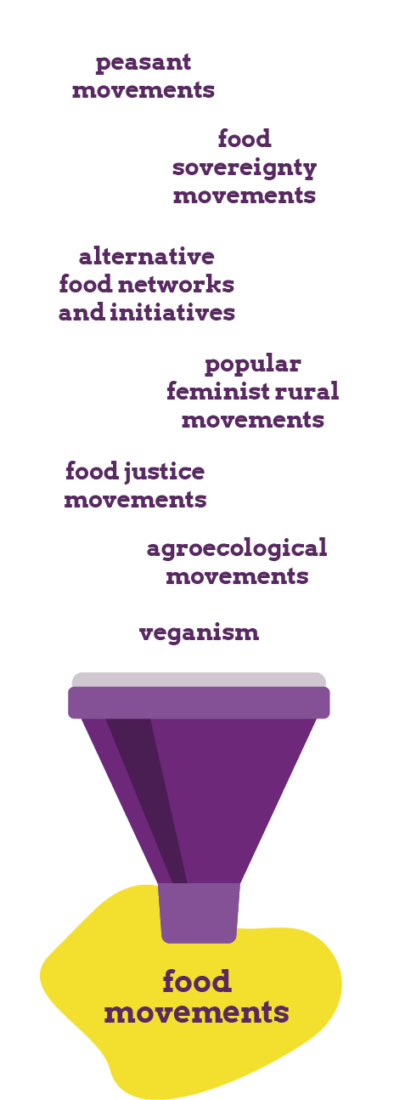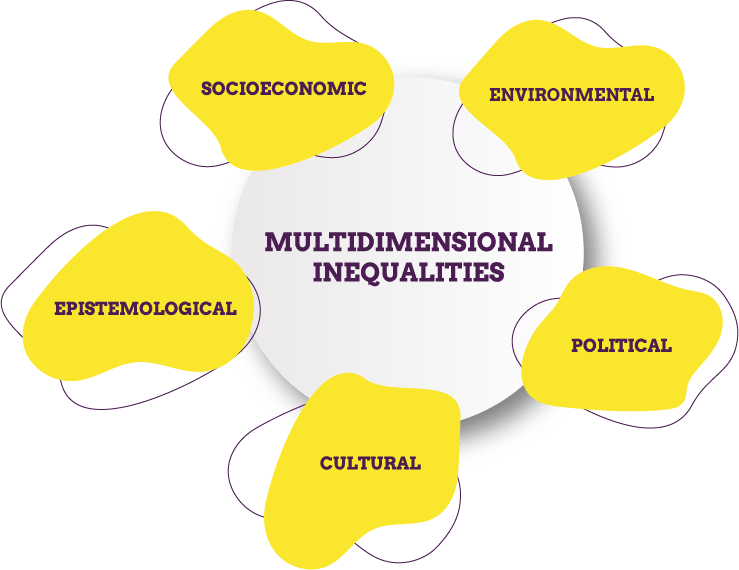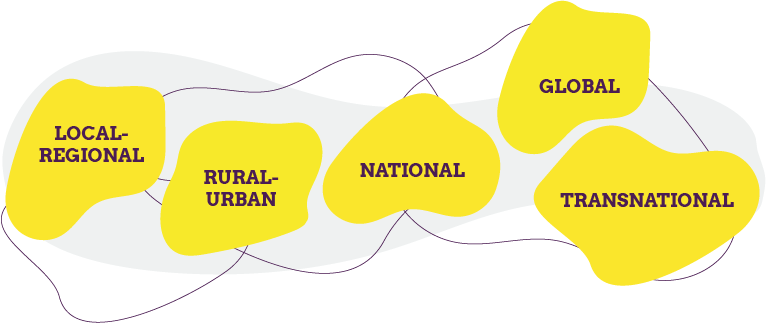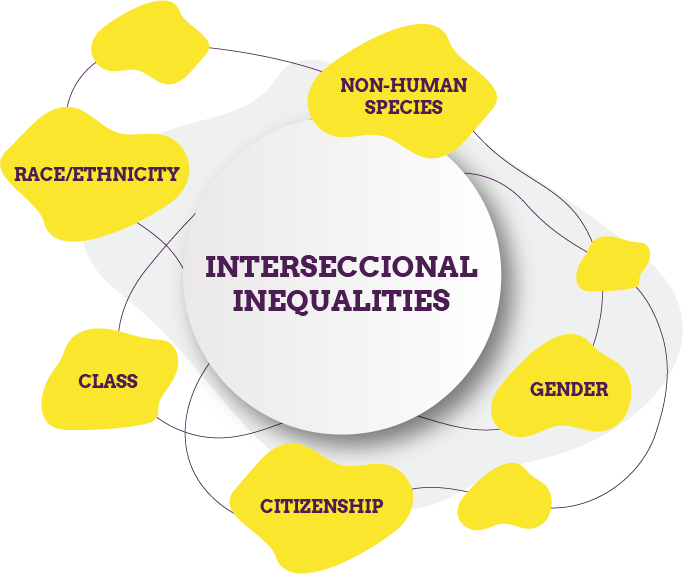Overview
What projects of social change are aspired for, or are already underway, to transform a society based on exploitative food politics towards a society that fosters ecological, just, and democratic food politics?
This broader research problem will be specified in four research questions:
- What are the main justice claims that mobilize citizens and consumers to denounce food inequalities and demand alternative food politics in different world regions?
- Which knowledges and technologies are found within food movements that aim to overcome food inequalities and shape ecological, fair, and democratic food politics?
- When are these alternative knowledges and technologies able to influence food politics in general and public policies in particular?
- How have multiple crises (sanitary, societal, economic, political) associated with the Covid-19 pandemic exacerbated and made food inequalities visible or provided windows of opportunity for change in food politics?
Our approach
Food for Justice conducts empirical research in two world regions: Europe, with a focus on Germany, and Latin America, predominantly in Brazil. Whenever possible, case studies from other countries in these world regions will be included. Food for Justice is situated within debates in transformation research on socio-environmental change in the tradition of critical social sciences. The project highlights contributions to this research agenda through the topic of food. The subject will be approached through the lenses of social movements engaged in food politics, conceptualized here as food movements, as instances to look at social change from below.
To assess the relative aspirations of food initiatives in achieving such all-encompassing transformations, Food for Justice relies on the conceptual framework of global entangled inequalities (Jelin, Motta, and Costa 2017; Boatcă 2016) and develops the concept of food inequalities, which are multidimensional, multi-scalar, intersectional and dynamic. Conceptual development is a central contribution of the project by linking debates on transformation to conceptual developments in research on social inequalities, operationalized in the topic of the role of food in socio-ecological transformations. Food for Justice is guided by decolonial and feminist epistemologies on food, ecologies, and knowledge generation. This entails an epistemological stance towards decentering the abstract, universal, undefined subjects of social movements and food politics.
Please, check for further information about our research design:

Transformation research on socio-environmental change

Expected contributions and outcomes
Food for Justice aims to achieve the following academic outcomes:
a) to consolidate a broader approach to food security and the bioeconomy agenda in Germany within the perspective of critical social sciences. This includes research topics such as social inequalities and social change, and contributions from environmental sociology, the sociology of space as well as interdisciplinary fields, such as science and technology studies, gender studies, and decolonial studies;
b) to articulate research fields that have often talked past each other under the umbrella of food studies, which is still an incipient area in the German scientific landscape;
c) to develop the concept of food inequalities as a contribution to social scientific research on social inequalities;
d) to develop theoretical and methodological contributions to transformation research, with a focus on socio-environmental change;
e) to contribute to decolonial theory and method by linking case studies from the Global North and the Global South, adopting a decolonial and feminist perspective.
Practical-relevant outcomes, Food for Justice aspires to:
a) identify socially demanded and accepted solutions to conflicts between the goals of food production, environmental protection, and climate change, due to agriculture having an ambivalent role at these crossroads;
b) identify knowledges and technologies that already respond to complex problems such as producing waste-free, healthy, environmentally friendly, and just food that benefits both producers and consumers;
c) identify, based on empirical studies, policy-relevant challenges, and opportunities for shaping social transformations of food systems with social, ecological and global justice;
d) offer analytical tools to assess the transnational impacts of the German National Bioeconomy Strategy, as well as learning from successful experiences in South America, by systematically comparing case studies across world regions and tracing their transnational connections;
e) provide policy-relevant information and recommendations to cooperation agencies in Germany that are working on projects to guarantee food security.
Conceptual Framework
Guided by the conceptual framework of global entangled inequalities, Food for Justice will investigate different dimensions and axes of food inequalities, in various scales and spatialities, and their dynamics of reproduction and change in food politics.
Multiple structural forces
socioeconomic, sociopolitical, socio-ecological, cultural, and epistemic) producing hierarchical orderings in food politics

Multi-scalar and relational perspective
focusing on the interdependencies between phenomena at different levels, from global historical trends to local negotiations, bridging urban and rural spatialities

Plural and intersectional inequalities
affecting social groups categorized across different axes of inequalities

Dynamics of transformation
in which food movements are agents of social change while looking into their relations to established interests that prevent a meaningful transformation towards democratic, ecological, and just food relations.

Case Studies
Justice claims
Wir haben es satt!
Case Study 1 – Wir haben es satt! (We are fed up!) looks at the campaign Meine Landwirtschaft (My Agriculture) in Germany, a broad coalition of more than 50 NGOs and social movements that has been organizing an annual protest march called Wir haben es satt! since 2011. It has mobilized people from across the country to Berlin to demand agrarian and food change.
Marcha das Margaridas
Case Study 2 – Marcha das Margaridas (Daisies’ March) is a coalition of women’s movements for an alternative model of rural development, social policies and women’s rights that incorporates demands such as food sovereignty and agroecology. It is organized by rural trade unions in partnership with agrarian and feminist movements and has taken place six times since the year 2000, bringing women from across Brazil to the national capital.
Knowledges and technologies
Alternative Food Networks (AFNs)
Case Study 3 – Alternative Food Networks (AFNs) maps community supported agriculture (CSA) in Germany, which are known as Solidarische Landwirtschaft, as well as other initiatives that establish alternative forms of relations between production and consumption.
Articulação National de Agroecologia (ANA)
Case Study 4 – Articulação National de Agroecologia (ANA or National Agroecological Articulation) addresses a network of experiences in agroecology in Brazil, comprising rural social movements, urban agriculture, self-organized neighborhoods in poor suburbs, household gardens, and feminist movements.
Public policies
Local food system in the city of Belo Horizonte
Case Study 5 – Local food system in the city of Belo Horizonte focuses on policy innovations at the local level, the metropolitan region of Belo Horizonte, Minas Gerais, Brazil. Since the implementation of an integrated approach to food security in the 1990s, the city has been identified as a model case for promoting the human right to food and has been show-cased at FAO publications.
Covid-19 pandemic
Case Studies on Covid-19 Pandemics and Food Inequalities
Due to the emergence of the health crisis and its correlated social and economic challenges, the research question “how has the Covid-19 pandemic contributed to increased visualization, exacerbation or reduction of food inequalities?” was included in the project. A series of case studies under the umbrella Case Studies on Covid-19 Pandemics and Food Inequalities will be included to address the question. Whereas in Brazil, there is evidence of food insecurity on the rise, especially for poorer households, led by women or black persons, the vulnerabilities seem to be different in Germany, such as the situation of migrant workers in the food industry and farmers’ workers. In both countries, the impacts of the pandemics in food inequalities will be analyzed. In doing so, we will explore how food movements and alternative food networks have adapted to the pandemics and disputed the openings for reform and transformation in food politics.
Methods
The research questions demand different types of data collection and analysis, and accordingly, a multi-methods approach of both quantitative and qualitative data was chosen.
Thus, the main demands and justice claims in food movements will be assessed through protest surveys, qualitative interviews, document analysis, and participant observation in ethnographic research with social movements.
Knowledges and technologies in alternative food networks and agroecological movements will be first mapped and then further studied with interviews and participant observation.
Policy innovations within the local level will be investigated through interviews with experts, policymakers, and ethnographical work following the state-society interactions.
The impacts of Covid-19 pandemics on food inequalities will be assessed through a combination of public opinion surveys on food insecurity, discourse analyses of newspaper articles covering food and pandemics, as well as digital ethnography and interviews with social movements and alternative food networks in their strategies to react to the pandemic.
For all case studies, there will be data collection such as documents, social media, and visual materials, also drawing on the opportunities for digital ethnographies.
Justice claims
What are the main justice claims that mobilize citizes and consumers to denounce food inequalities and demand alternative food politics in different world regions?
- – Protest surveys
- – Qualitative interviews
- – Document analysis
- – Participant observation
Knowledges and technologies
Which knowledges and technologies are found within food movements that aim to overcome food inequalities and shape ecological, fair and democratic food politics?
- – Mapping
- – Qualitative Interviews
- – Participant observation
- – Digital ethnography
Public policies
When are these alternative knowledges and technologies able to influence food politics in general, and public policies, in particular?
- – Survey
- – Interviews with experts
- – Intervews with policy makers
- – Ethnographical work following the state-society interactions
- – Digital ethnographies
Covid-19 pandemic
How have multiple crises (sanitary, societal, economic, political) associated with the Covid-19 pandemic exacerbated and visibilized food inequalities, or provided windows of opportunity for change in food politics?
- – Public opinion survey
- – Discourse analyses of newspaper articles
- – Qualitative Interviews
- – Digital ethnographies
Sustainable development goals (SDGs)
Drawing from global political debates on the sustainable development goals (SDGs) set by the United Nations, food security, which figures prominently as SDG 2, will be considered in its relationship to other goals, in particular those of good health and well-being (SDG 3), gender equality (SDG 5), reduced inequalities (SDG 10), responsible consumption and production (SDG 12), life on land (SDG 15), and peace, justice and strong institutions (SDG 16).




